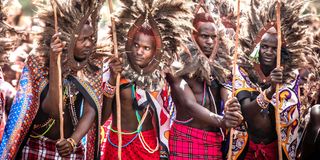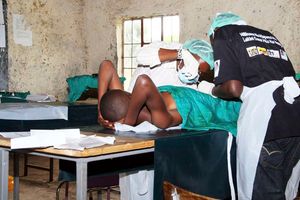
Some of the 250 boys during a ceremony to mark the end of 14 days after circumscion under the Kikuyu tradition, in Molo, Nakuru County on November 26, 2023.
Thousands of parents across Kenya have entrusted the circumcision of their sons to churches this holiday, entrenching a trend where religious entities are taking over functions traditionally conducted by elders.
From Nairobi to Siakago, Eldoret to Embu, the selling point for religious institutions is that they will train the boys on how to be morally upright as they undergo medically supervised initiation, unlike what happened in traditional times.
Characterised by seminars, admission of initiated boys until they recover from the cut, and pass-out ceremonies; initiations organised by churches are ushering in a culture redefine.
However, there is opposition from some quarters as to the long-term effect of this trend, among them from the Kikuyu Council of Elders.
“The role of circumcising the boy child rests solely with elders,” the council’s patron Kung’u Muigai said in a past interview, adding that boys are even interacting with women who attend to them during that process — which beats the traditional purpose of circumcision.
“One of the reasons we circumcise the boys is to remove them from the influence of the mother,” he said.
Despite noting that they had no problem with the church per se, Mr Muigai proclaimed: “I would urge the churches to concentrate on their role of taking people to heaven.”

Young Maasai men wearing a ceremonial headdress made of ostrich feathers take part in the Eunoto ceremony near Kilgoris, Kenya on August 18, 2023.
However, developmental psychologist Mbutu Kariuki notes that there is nothing amiss when churches take up the role.
“Culture is always evolving. They mean well,” Mr Kariuki told Nation Lifestyle. “There is a lot of weakness in the cultural fabric as we know it, and the church can come in and be a uniting factor.”
He, however, pointed out where churches are getting it wrong. More on that later.
Going through some of the notices posted by various organisations offering initiation services this year, it emerges that the programmes have many similarities.
In circumcision programmes offered by the church, the boys are taught life skills, personal hygiene, stress management, self-awareness, spirituality, dangers of drug abuse, sexually transmitted diseases, cultural awareness, and relationships, among other topics.
Some churches charge Sh6,500 while others charge as much as Sh250,000.
The initiation programme for the Archdiocese of Nairobi, which targeted 11-year-olds, for instance, charged parents Sh13,500 for each boy, and provided clothes, and stationery, among other items.
“The camp lasts 11 days and offers a combination of a physical rite of passage and a value-based education to help these boys transition into responsible adulthood,” said a form that parents were required to fill out to register their sons for the ceremony, which took place in November.
For the Anglican Church of Kenya parish of St Peter’s in Kesses, Uasin Gishu County, the amount for each boy was set at Sh30,000.
William Too, one of the organisers, told Nation Lifestyle ahead of the pass-out that they registered 28 boys.
“This is more than just a ceremony; it’s a journey into manhood, guided by Christian values and mentorship,” the Victors Assembly Church in Nairobi said in its announcement of the initiation programme in November.
“The initiates will be imparted with skills and values that drive them into responsible men in the society today and in days to come,” said Siakago Catholic Parish, which held an initiation process between November 24 and December 5. The fee required was Sh6,500 for each boy.
Class divide
Critics argue that the church programmes, which vary in cost, are creating a class divide, says James Maina, an elder in Nandi County.
“What we are witnessing are two emerging social classes of initiates: those who can afford the exorbitant charges, and those who have maintained the traditional rite of passage where the cost is affordable to them,” said Mr Maina.
He noted that some parents prefer the church-led processes because professionals are used in the circumcision.
“In some cases, complications arise and these are the processes that need to be reviewed,” noted Mr Maina.
For instance, last year, 15 boys from Elgeyo Marakwet and Uasin Gishu counties are said to have died due to complications related to circumcision.
Major (Retired) John Seii, who is part of the Kalenjin Council of Elders, said the grouping has issued directives on who should take care of initiates to guarantee their safety. “Elders play a vital role in ensuring that our culture is passed down to different generations. This needs to be safely done,” said Mr Seii.
Some of the parents who spoke with Lifestyle argued that the money asked by churches was too high.
“How do I pay Sh50,000 for circumcision when I need to pay fees next year apart from other basic needs like food and clothing for the other children?” posed Joshua Kosgei from Tulwet in Uasin Gishu county.
A circumcision procedure under local anaesthesia in most public health facilities costs less than Sh10,000, including medication and regular check-ups during the three weeks.

Hundreds of young Maasai men wearing traditional clothes and red ochre pigment on their heads walk together while heading to the start of the Eunoto ceremony in a remote area near Kilgoris, Kenya on August 18, 2023.
Long-term mentoring
Money aside, as the role played by churches in initiation ceremonies grows, Mr Kariuki, the psychologist, is urging religious institutions to pay attention to long-term mentoring of boys, since a crash programme that lasts a few weeks will not do.
“We need to understand that the creation of a man is a process,” he said, noting that churches can tap into the professionals among them to offer continuous training to boys.
Observing that the church is an important ecological asset for any child, Mr Kariuki observed that the training that lasts a few days is “a fallacy”.
“The process of development is complex, what the church needs to do as an ecological asset is to come strong from when children are young.”
Mr Kariuki argues that with continuous training that is not an “after-thought as some programmes” tend to be, the church can be a great component of a boy’s growth, especially in an era where boys are seen to have fewer mentors and are less empowered than girls.
“I think the church has a role to play, but they need to play it well,” he said, adding, “The church must make sure that young people get the right skills for life.”
Why parents are going the church way
According to Rev Gatheca Ngamate, the CEO and director of Boyz II Men-torship Africa, an organisation that holds Christian initiation camps for boys, parents are favouring church-led processes for three main reasons.
The first, he said, is the assurance that the circumcision will be done the right way.
“The church is going to do it in the right way because it has to be done professionally,” he said. “Out there, it is usually done by people who are not really professional doctors or medics, but maybe people who have acquired this (practice).”
The second reason, he said, is the knowledge that children will not be exposed to teachings that may be retrogressive. Typical church camps give teachings such as avoiding suicide, drug abuse, peer pressure, among others.
“When it’s being done by us at the church, there is what the children are going to get to go home with (the right lessons),” he says. “When I went through it, I was taught so many weird things which were not relevant—things that are not building, things that are archaic, things which are not helpful," said Rev Gatheca. “When we bring them to church, we impart a lot of lessons that are building, that are helpful to them, which will not only help them even as they transit but also in life.”
Psychologist Mbutu Kariuki said some of the retrogressive teachings given to initiates in his community encouraged boys to explore sexual relationships immediately after initiation.

Young Maasai men confront a Maasai elder as part of the ceremonial activities during the Eunoto ceremony in a remote area near Kilgoris, Kenya on August 18, 2023.
The second reason that parents are embracing church processes, Rev Gatheca said, is that religious groups are universal and don’t lay emphasis on certain cultural beliefs.
“Parents are preferring this because it’s an easier way of doing it. It doesn’t have to involve going back to the village,” said the pastor.
Rev Gatheca’s programmes last 10 days, and they involve the boys’ fathers, who are required to attend and have a talk with their sons.
“They’re busy people out there. So, there’s a need for them to spend time with their sons. But beyond spending time, we also encourage them to be able to speak a blessing,” he said.
Regarding the pricing of initiation procedures led by the church, Rev Gatheca notes that church packages are relatively cheaper than those issued by some high-end hospitals.
“The more days the camp takes, the more expensive it is. But I think this is something that even the government should come in and help,” said Rev Gatheca. “The government should encourage the churches so that now it can be done professionally, done the way it is supposed to be done, and beyond being done as it is supposed to be done, there is also an aspect of the benefits that go with circumcision. And I believe the government should be advocating for circumcision so that cases of HIV or so can also come down a bit.”
Girls rite of passage
Meanwhile, it is an elevation of tradition and at the same time an embrace of the changing times in the various alternative rites of passage that churches are organising for girls across the country.
With female genital mutilation (FGM) banned, girls are marking a transition into adulthood by attending trainings organised by their churches and observing some of their traditional practices, like being blessed by being spat on, wearing traditional regalia, among others.
The Catholic Church, the Presbyterian Church of East Africa (PCEA), and the Seventh-Day Adventist (SDA) are among the institutions that have this year organised events over the December holiday to mark a transition for girls. The girls rite of passage programmes range from Sh1,500 to Sh12,000.
The Catholic Archdiocese of Nairobi, for instance, organises regular transition camps for girls.
“The Rite of Initiation into Committed Adulthood (Rica) is a camp organised for girls to guide them into a significant new stage of growth: adulthood. The Catholic Archdiocese of Nairobi Youth Office offers this programme, aiming to help girls transition through this vital phase with a strong foundation in Christian faith and values,” says an online form that parents were required to fill out when registering their daughters.
At the PCEA Kahawa Farmers Church, Sh15,000 was required of each girl for a programme that happened between November 24 and December 1. The programme was geared towards offering counselling sessions and equipping girls “with essential life skills to navigate adolescence and beyond.”
Elsewhere, the Sombicho SDA Church in Kericho County had its girls’ rite-of-passage event take place from December 9-13. Participants would get a training manual and a certificate of completion.
Wrapped in lesos and wearing shiny ribbons around their necks, the girls danced alongside their mothers in videos shared on social media. This happened inside a church.
Debrah Chepkemoi, one of the people in charge, said: “As we fight FGM, we also embrace the modern teachings of building resilient, confident, responsible and young women leaders.”
According to Mr Kariuki, some of the traditional initiation practices are repugnant, and so the inclusion of the church is welcome.
“Sometimes we say ‘mwacha mila ni mtumwa (whoever abandons their culture is a slave)’, but abandoning some practices sometimes is bravery, because some of the cultures were repugnant, and you do not want anything to do with them,” he said.
eondieki@ke.nationmedia.com
bbii@ke.nationmedia.com







